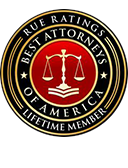

Immobilization and Criminal Forfeiture of the Vehicle
After a conviction for OVI in Ohio, the court must impose a sentence which include certain minimum mandatory provisions as provided by law. As a sanction for a conviction of some OVI offenses, the court must impose certain immobilization or forfeiture provisions.
Under these provisions, the court shall order the immobilization of the vehicle the offender was operating at the time of the offense, if registered to the offender, and impoundment of the license plates under R.C.§§4503.233 and 4511.19 or 4511.193.
Alternative, the court must order the criminal forfeiture of the vehicle if registered to the offender under R.C. §§4503.234 and 4511.19 or R.C.§§4511.193 and 4511.195(C) and (D).
The immobilization or forfeiture of an OVI offender’s vehicle, and the impoundment of the license plates, comes into play only AFTER the offender’s first OVI conviction. R.C. §4511.19(G)(1)(b), (c), (d), and (e), and R.C. §4503.233.
In many of these cases, a family member will seek a waiver of the immobilization requirement under R.C. §4503.235(A) because the immobilization would cause a hardship on an innocent family member that needs to drive the vehicle.
If you have questions about Ohio law regarding the immobilization and criminal forfeiture of a vehicle after a second or subsequent OVI conviction, then contact the criminal defense attorneys at Joslyn Law Firm. Call today to discuss your case.
Statutory Provisions for OVI Immobilization and Criminal Forfeiture
The statutory provisions that the court must impose in a second or subsequent OVI case include:
- For a second OVI within 6 years, the court must impose:
- a Class 4 suspension that last for one to five years;
- Limited driving privileges are permitted;
- The court must order a 90 day immobilization of the vehicle; and
- a 90 day mandatory license plate impoundment.
- For a third OVI within 6 years, the court must impose:
- a Class 3 suspension that last for two to ten years;
- Limited driving privileges are permitted;
- The court must order a mandatory criminal forfeiture of the vehicle.
- For a fourth or subsequent OVI within 6 years or a 6th OVI within 20 years, the court must impose:
- a Class 2 suspension that last for three years to life;
- Limited driving privileges are permitted;
- The court must order a mandatory criminal forfeiture of the vehicle.
- For a OVI conviction after a prior felony conviction, the the court must impose:
- a Class 2 suspension that last for three years to life;
- Limited driving privileges are permitted;
- The court must order a mandatory criminal forfeiture of the vehicle.
After the conviction, the OVI offender must pay a $100 immobilization fee. See R.C.§4503.233(B). The immobilization or forfeiture of the vehicle applies only if the vehicle is registered to the offender and the vehicle is involved in the offense.
Requirements for the OVI Immobilization Order
The immobilization order from the court shall indicate the following:
- The period of immobilization;
- The make, model, and year of the vehicle that is the subject of the order;
- The date on which it is issued;
- The person or agency designated to execute the order, which shall be either the law enforcement agency that employs the officer who seized the vehicle, a bailiff of the court, another person the court deems appropriate, or the law enforcement agency with jurisdiction over the place of residence of the vehicle owner; and
- That neither the registrar nor a deputy registrar will be permitted to accept an application for the license plate registration of any motor vehicle in the name of the vehicle owner until the immobilization fee is paid.
- The place where the immobilization shall be carried out, which shall be either:
- A place owned by a law enforcement or other government agency;
- A commercially operated private storage lot; or
- A place to which one of the following applies:
- The place is leased by or otherwise under the control of a law enforcement or other government agency;
- The place is owned by the offender, the offender’s spouse, or a parent or child of the offender;
- The place is owned by a private person or entity, and prior to the issuance of the order, the private person or entity that owns the place, or the authorized agent of the person or entity, has given express written consent for the immobilization to be carried out; or
- The place is a public street or highway on which the vehicle is parked in accordance with law.
When the Immobilization Begins
The immobilization period begins on the day on which the vehicle is immobilized. If the vehicle was seized pursuant to R.C. §4510.41 or §4511.195, the time between the seizure and the beginning of the period shall be credited against the immobilization period. R.C. §4503.233(D)(1).
The person or agency designated to immobilize the vehicle shall seize or retain that vehicle’s license plates and forward them to the bureau of motor vehicles. The registrar shall destroy the license plates.
At the end of the period, and upon payment of the fee, the registrar shall authorize the release of the vehicle and authorize the issuance of new license plates and a new certificate of registration, if necessary. The offender shall be required to pay the same fee required for the replacement of lost, mutilated, or destroyed plates and certificates of registration. R.C. §4503.233(C).
If the vehicle subject to the immobilization order is found being operated on any street or highway during the immobilization period, the vehicle shall be seized, removed from the street, and criminally forfeited and disposed of pursuant to R.C. §4503.234. However, no vehicle forfeited shall be considered contraband under R.C. Chapter 2981.
If the vehicle is not claimed within seven days after the end of the immobilization period, or if the offender has not paid the fee, the person or agency that immobilized the vehicle shall send a written notice to the offender at his/her last known address advising that the immobilization period has ended, that the offender has twenty days to pay the fee and obtain the vehicle, and that is the offender does not pay the fee and obtain the vehicle, it will be forfeited under R.C. §4503.234 to the entity entitled to the fee. R.C.§4503.234(D)(3).
Attempts to Sell the Immobilized Vehicle Without Prior Court Approval
An offender may not sell the immobilized vehicle without prior court approval. If the court is satisfied that the sale will be in good faith, and is not an attempt to circumvent the immobilization order, it may certify its consent to the offender and the registrar. R.C. §4503.233(D)(4).
If the title to the immobilized vehicle is assigned or transferred without court approval between the time of arrest and the time of actual immobilization of the vehicle, the court shall order that for a period of two years neither the registrar nor any deputy registrar accept an application for the registration of any motor vehicle in the offender’s name. R.C. §4503.233(D)(5).
If the court finds, after a hearing with notice to all interested parties, in conjunction with R.C. §4503.233(E)(3), that the offender does not intend to seek release of the vehicle, or is unable or unwilling to pay the expenses and charges incurred in the removal and storage of the subject vehicle, the court may order that the title to the vehicle be transferred in the following order of priority:
- Into the name of the entity entitled to the immobilization fee:
- If title is transferred to the entity entitled to the immobilization fee, that entity shall pay all liens on the vehicle;
- Into the name of a lien holder:
- If title is transferred to a lien holder, the lien holder shall pay all expenses and charges incurred in the vehicle’s removal and storage; or
- Into the name of the owner of the storage facility. R.C. §4503.233(E)(1).
Disposing of the Vehicle after Immobilization
Whoever receives title may keep or dispose of the vehicle in any legal manner. In no case, however, shall the person or entity transfer the vehicle to the person who is the immediate previous owner. R.C. §4503.233(E)(1).
If the owner assigns the vehicle to a salvage dealer or scrap metal processing facility, the person or entity shall send he assigned certificate of title to the clerk of court of common pleas of the county in which the salvage dealer or scrap facility is located. The person or entity shall mark the face of the title with the words “FOR DESTRUCTION” and shall deliver a copy to the salvage dealer or scrap facility for its records. R.C. §4503.233(E)(1).
The court shall order removal of the license plates from the vehicle and cause them to be sent to the registrar. No further proceedings shall take place pursuant to R.C. §4503.233(E), except the offender remains liable for the immobilization fee. R.C. §4503.233(E)(2).
Waiver of Immobilization
Pursuant to R.C. §4503.235(A), the court may determine not to order immobilization of a vehicle as required by R.C. §§4511.19(G) or 4511.193(B), if both of the following apply:
- Prior to the issuance of the order, a family or household member of the offender files a motion identifying the vehicle and requesting that the order not be issued on the ground that the family or household member is completely dependent on the vehicle for necessities of life and that immobilization would be an undue hardship to the family or household member; and
- The court determines that the family or household member is completely dependent on the vehicle for the necessities of life and that the immobilization of the vehicle would be an undue hardship on the family or household member.
Under Ohio’s vehicle immobilization statute, the term “Family or household member” is defined in R.C. §2919.25 (except the person must currently be residing with the offender. R.C. §4503.235(F)).
The immobilization waiver order shall specify the time period for which it is effective, which is for the same period of time for which the immobilization of the vehicle otherwise would have been required under R.C. §§4511.19(G) or 4511.193(B).
A copy of the order shall be provided to the offender, the family or household member, and entered into the court’s record. The court shall impose a waiver fee of $50, and shall determine whether the offender or family or household member pays the fee. R.C. §4503.235(B).
The order shall identify the family or household member who requested the order and the vehicle to which it applies, the family or household members who are permitted to operate the vehicle, and shall identify the offender and specify that he/she is not permitted to operate the vehicle.
The family or household member is required to display restricted plates on the vehicle under R.C. §4503.231 for the entire period for which the vehicle would have been immobilized. R.C. §4503.235(C).
A family or household member so permitted shall not allow the offender to operate the vehicle subject to the waiver order. If the family or household member allows the offender to operate the vehicle, both of the following apply:
The court shall terminate the order, and shall issue an immobilization order in accordance with R.C. §4503.233, and the order shall be in effect for the remaining period of time for which the order otherwise would have been in effect; and
The conduct of the family or household member is in violation of R.C. §4511.203. Further, the conduct of the offender in operating the vehicle constitutes a 1st degree misdemeanor in violation of R.C. §4503.235(E)
If title to the motor vehicle that is subject to an order of criminal forfeiture under R.C.§4511.19(G)(1)(c), (d), or (e), and R.C. §4503.234(B)(2) or (3), is assigned or transferred, the court, in addition to any other penalty, may fine the offender the value of the vehicle as determined by publications of the National Auto Dealers Association. R.C. §4511.195(G)(6).
This article was last updated on Monday, November 16, 2015.



























